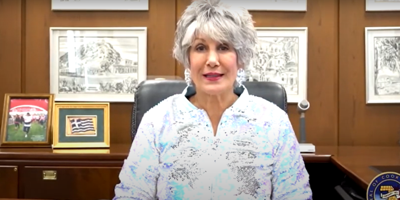
Cook County Treasurer Maria Pappas
CHICAGO - Cook County will need to face a class action lawsuit accusing the county of unconstitutionally taking hundreds of thousands of dollars of home equity at a time from people who did not pay their property taxes, a Chicago federal judge has ruled.
On July 7, U.S. District Judge Matthew F. Kennelly granted the request for a class action sought by a group of former homeowners embroiled in a court fight with Cook County over the county's efforts to escape liability under a recent U.S. Supreme Court ruling that appeared to strike down the system the county has long used to seize and sell off homes over delinquent property taxes.
In the decision, Kennelly did not indicate if he believed the homeowners would ultimately succeed in their case. But the judge said they had at least to this point shown that they deserved the chance to make the county defend the constitutionality of its so-called "tax sale" collection system and address the accuracy of the scandal-plagued property tax assessment system that underpins the operation.
The judge also said he believed at least 1,700 people whose homes were taken under the system should get a chance to press their claims for possible reimbursement of at least some of the money the plaintiffs claim was unconstitutionally taken.
The decision marks a potentially key win for plaintiffs in their years-long legal battle with Cook County over its property tax collection system.
The lawsuit, filed in 2022 against the government of Illinois' largest county, is one of two major legal actions pending in Chicago's federal courts addressing similar questions.
A separate lawsuit has been lodged against a group of other county governments, including Illinois' second and third largest counties, DuPage and Lake counties, also seeks a court order declaring their property "tax sale" systems unconstitutional and seeks potential refunds to people allegedly victimized under those systems.
The cases all center on one common accusation: That Illinois and its county governments have all but illegally ignored a recent landmark U.S. Supreme Court decision and continued to seize homes over unpaid property taxes.
In the decision at the heart of the cases, the 2023 ruling known as Hennepin v Tyler, the Supreme Court sided with a homeowner in Hennepin County, Minnesota, whose $40,000 condominium was seized and sold by the county over $2,300 in unpaid property taxes, plus $12,700 in penalties and interest. Hennepin County then kept the surplus from the sale, in a practice dubbed by critics as "home equity theft."
In a unanimous ruling authored by Chief Justice John Roberts, the court said the county's tax sale went too far, and the county should only be allowed to collect what is owed, with the homeowner retaining the surplus.
Some justices also said such "equity theft" also amounts to violations on the Eighth Amendment's ban on "excessive fines."
In Illinois, homeowners have for decades similarly lost their homes over thousands of dollars in unpaid property taxes under the state's Property Tax Code tax sale system.
Under the tax sale process, the unpaid taxes - known as tax debt - is sold by the county, typically to a real estate investor seeking to profit by either selling the property or keeping it and renting it to others.
Illinois law gives homeowners 30 months to redeem the property by paying off the tax lien. Throughout that redemption process, however, the debt continues to grow through the addition of interest and fees. Ultimately, the investor and county can choose to seize the property, evict the residents and sell the property for full market value, potentially reaping massive profits.
Critics in Illinois have noted this process has typically victimized those least able to absorb such a financial hit, including elderly and black homeowners living in low-income communities.
The lawsuits against DuPage, Lake and the other Illinois counties landed in court after the Tyler ruling.
That lawsuit remains pending, as a different federal judge has yet to decide how that action may proceed.
Most recently, counties in that case have asked a federal judge to also force the Illinois state government to share the burden of any judgments against the counties, because the counties were only carrying out their duties as part of an unconstitutional system established by the state. The state has asked the court to toss the counties' claim. A judge has not yet ruled on that matter.
Meanwhile, Kennelly has taken actions in the case against Cook County.
The case against Cook County was filed before the Hennepin v Tyler ruling. It was initially also based in claims that the county's system illegally discriminated against black and Hispanic homeowners.
Kennelly tossed the racial discrimination claims in 2024.
However, the claims accusing Cook County of unconstitutional takings continued.
And now, Kennelly said he believed the plaintiffs have done enough to this point to establish that they should be allowed to pursue their claims collectively, rather than through individual lawsuits from each of more than 1,700 former homeowners who have been subjected to Cook County's tax sale system.
The county had attempted to prevent the judge from certifying a class action involving all 1,700 homeowners potentially included in the case. The county argued every homeowner's property, situation and experience is too different to allow them to proceed together.
But Kennelly said the class members all share one common enough experience: Losing their homes through a Cook County tax sale to allow the county to collect unpaid property taxes worth only a fraction of their homes' actual value.
The county also sought to undermine the lawsuit by asserting the market appraisals the plaintiffs presented to demonstrate the alleged "equity theft" may not accurately reflect the homes' actual worth.
The judge conceded that point, noting Cook County's tax assessments may show differing values.
Kennelly, however, said differences between home values delivered by Cook County's assessment system - a system long marked by scandals - and those rendered under market appraisals only demonstrates the need for more proceedings in the case to land at a correct estimate.
In the ruling, Kennelly noted he was not deciding the constitutional questions at this point.
He certified so-called "issue classes" to allow the plaintiffs and Cook County the opportunity to make their cases over two key questions:
- "Whether the loss of a residential property owner's excess equity as a result of Cook County's tax sale procedures is a 'taking' by Cook County under the Fifth Amendment," and;
- "Whether the loss of remaining equity as a result of Cook County's tax sale procedures is a 'fine' by Cook County subject to Eighth Amendment scrutiny."
Should those questions be decided in favor of Cook County, Kennelly noted, the case would end.
Should they land in favor of the plaintiffs, however, Kennelly said the plaintiffs could proceed to the next stages in the action, potentially including deciding if Cook County can be forced to repay people who lost their homes at tax sale and which homeowners may be eligible to get refunds.
While some of those questions may need to be addressed individually later, Kennelly said it makes more sense to tackle as many of the foundational questions in one combined class action proceeding.
"... Most of the material facts concerning each class member are identical - every proposed class member lost their residential property as a result of Cook County's tax sale procedures," Kennelly wrote. "There are thus common issues of law and fact concerning Cook County's tax sale procedures that can be resolved 'in one fell swoop' that will not 'be enhanced by repeated proceedings' regarding those same procedures.
"The alternative, potentially over 1,700 separate lawsuits all challenging Cook County's tax sale procedures, is wasteful in comparison."
Plaintiffs’ attorneys include Brian D. Roche, of the firm of Reed Smith, of Chicago; Charles R. Watkins and David Guin, of Guin, Stokes & Evans, of Oak Park; and John Bouman, Lawrence Wood and Daniel Schneider, of Legal Action Chicago.
Watkins and Guin also served as co-counsel in the Tyler case before the U.S. Supreme Court and are co-counsel on the other pending "tax sale" lawsuit against DuPage County, Lake County and six other Illinois counties.






